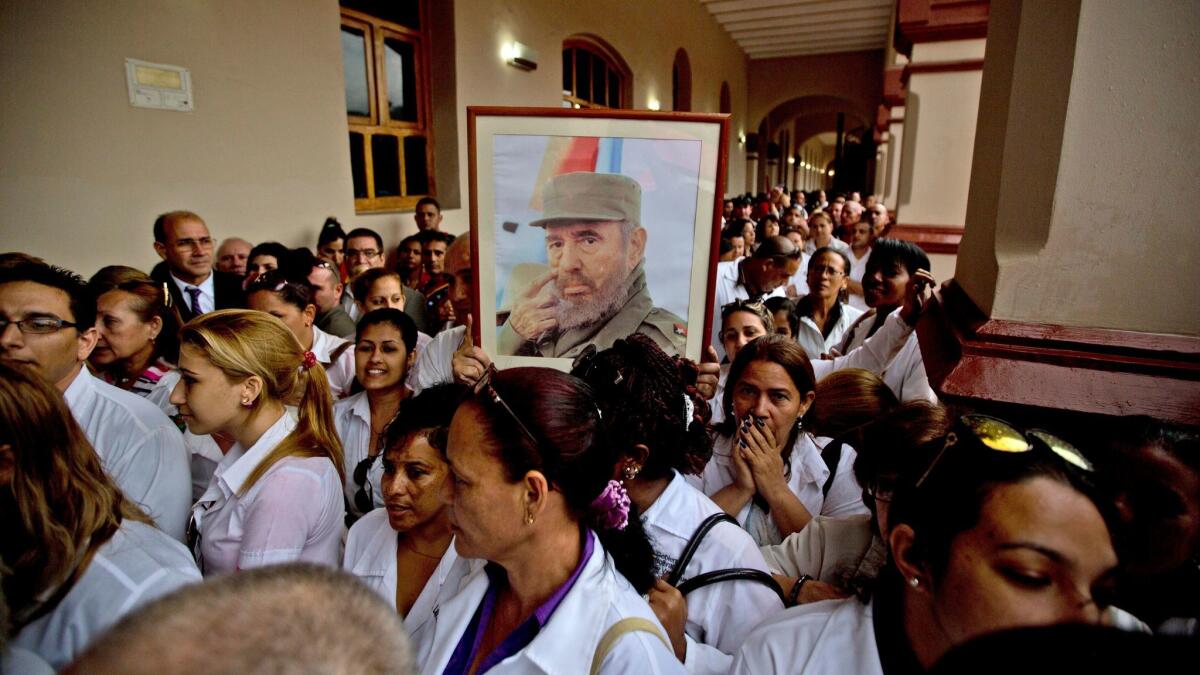When Obama dropped the ‘wet foot, dry foot’ policy, he also snuffed out another program few Americans knew about

- Share via
Reporting from TAMPA, FLA. — When President Obama killed the 22-year-old policy giving preferential, fast-track citizenship to Cubans who could make it to the U.S., his administration nixed another program, too. Not well known to most Americans, it sought to undermine the Cuban government through a form of brain drain.
The Cuban Medical Professional Parole Program, created in 2006 under then-President George W. Bush, aimed to lure away some of the tens of thousands of doctors, nurses and other medical workers the island nation dispatched around the world, in what the Castro government touted as Cuban Medical Internationalism.
The U.S. strategy was an appendix to the “wet foot, dry foot” policy created in the 1990s. Under “wet foot, dry foot,” Cubans who reached American soil on their own could stay in the U.S. But the medical parole program offered a path to American citizenship through any U.S. embassy and consulate abroad, according to a 2009 U.S. Department of State fact sheet.
“If you were a Cuban doctor and bumped into some guy from the U.S. Embassy in Johannesburg, South Africa, and told him you wanted to take advantage of the medical parole program, then you’d be taken to the embassy and eventually be flown to the U.S., get residency — citizenship — and a job,” said Al Fox, founder of the Alliance for Responsible Cuba Policy Foundation, which has advocated for the normalization of American-Cuban relations.
Fox, speaking Sunday from Tampa, said the medical parole program was pushed by hard-liner anti-Castro Cubans in Miami. He also said the program was a smear campaign meant to discredit any actual good Cuba’s medical community was doing abroad.
Since the 1959 revolution that brought Fidel Castro to power, Cuba has sent medical workers to countries across the globe, mostly in Latin America and Africa, to gain allies and heighten its humanitarian profile. Those efforts, some subsidized by the United Nations’ World Health Organization, also became lucrative, according to Sebastian A. Arcos, associate director for the Cuban Research Institute at Florida International University’s campus in Miami.
He said Cuba’s exportation of skilled medical workers has become one of the most important sources of revenue for the communist government, bringing in billions of dollars over time. Critics have denounced Cuba’s export of doctors, nurses and other medical professional as conscription.
“The Castro regime keeps 95% of the doctors’ salaries that are paid for, even by the WHO,” Arcos said. “Then these doctors and nurses work essentially under slave-labor wage conditions. In countries like Brazil and Venezuela, which have very friendly relations with Cuba, those countries pay Cuba directly, sometimes in oil, and often times medical staff working in those countries get nothing.”
When Cuban medical professionals arrive in another country, Arcos said, the Cuban embassy typically confiscates their passports in hopes of preventing them from fleeing.
Arcos’ sister, a doctor, was sent to Eritrea, a deeply isolated nation in the Horn of Africa run by a former-rebel-leader-turned dictator named Isaias Afwerki, accused of human rights abuses domestically and state-sponsored terrorism in the region.
Arcos’ sister fled Eritrea and entered the medical parole program in what he described as a highly coordinated and secretive plan. He did not wish to release details because it could put other medical workers around the world at risk, but said her escape was aided by people in Eritrea.
Obama scrapped the medical parole program and “wet foot, dry foot” policy Thursday, the latest step to normalize relations between the U.S. and its old Cold War adversary. The moves sent shock waves through many anti-Castro Cuban communities in Florida and beyond.
“He shouldn’t have gotten rid of that,” said Omar Lopez, human rights director with the Cuban American National Foundation in Miami. “It served as something comparable to America’s own Underground Railroad and now the doors are closed to doctors around the world working under those conditions. It’s a paradox. I could say it’s a criminal paradox.… That’s been a main priority of the Cuban government for years with the U.S. because Cuba needs to keep selling its doctors abroad.”
Arcos was critical of Obama, too.
“All this brouhaha over wet foot, dry foot is a smoke screen to hide the fact he eliminated the medical parole program — he didn’t have to do that,” Arcos said. “Now Obama has slammed the door shut for the entire Cuban medical community from escaping the Castro regime. The only reason President Obama eliminated the medical parole program was to appease Raul Castro.”
Lopez added, “It was a last-minute decision by the president, obviously, but we have to wait and see what happens.”
Why?
“Because President-elect Trump may erase President Obama’s decision,” Lopez said.
Neuhaus is a special correspondent.
To read the article in Spanish, click here
ALSO
Bitter, disbelieving: Cuban migrants en route to U.S. hope for some kind of eleventh-hour reprieve
What we know about Christopher Steele, the British ex-spy who wrote the controversial Trump dossier
As striking Kenyan doctors dig in, patients are forgotten and a baby dies
More to Read
Sign up for Essential California
The most important California stories and recommendations in your inbox every morning.
You may occasionally receive promotional content from the Los Angeles Times.










